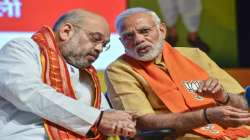The Inter-State Council, which works to promote and support cooperative federalism in the country, has been reconstituted with Prime Minister Narendra Modi as chairman and chief ministers of all states, and six Union ministers as members.
Ten union ministers will be the permanent invitees to the Inter-State Council, according to official notification.
The government has also reconstituted the standing committee of the Inter-State Council with Union Home Minister Amit Shah as chairman.
While the prime minister is the chairman, chief ministers of all states and Union Territories have a legislative assembly and the administrators of UTs not having a legislative assembly have been made members.
The union ministers who were made members of the council are: Rajnath Singh, Amit Shah, Nirmala Sitharaman, Narendra Singh Tomar, Virendra Kumar, Hardeep Singh Puri, Nitin Gadkari, S Jaishankar, Arjun Munda, Piyush Goyal, Dhamendra Pradhan,
Pralhad Joshi, Ashwini Vaishnaw, Gajendra Singh Shekhawat, Kiren Rijiju and Bhupender Yadav.
The mandate of the council is to create a strong institutional framework to promote and support cooperative federalism in the country, activate the council and zonal councils by organising its regular meetings.
It also facilitates consideration of all pending and emerging issues of the centre- state and inter-state relations by the zonal councils and inter-state council and develop a sound system of monitoring the implementation of the recommendations of the inter-state council and zonal councils.
In a separate notification, the Union home ministry said the composition of the standing committee of the Inter-State Council will be: Amit Shah (chairman) while members include Union ministers Nirmala Sitharaman, Narendra Singh Tomar, Virendra Kumar and Gajendra Singh Shekhawat.
The chief ministers of Andhra Pradesh, Assam, Bihar, Gujarat, Maharashtra, Odisha, Punjab and Uttar Pradesh are also members of the standing committee of the Inter-State Council.
The standing committee will have continuous consultation and process matters for consideration of the council, process all matters pertaining to centre-state relations before they are taken up for consideration in the inter-state council.
The standing committee also monitors the implementation of the decisions taken on the recommendations of the council and consider any other matter referred to it by the chairman or the council.
The standing committee may, if necessary, invite experts and persons eminent in specific fields to have the benefit of their views while deliberating upon the related subjects.
Latest India News
